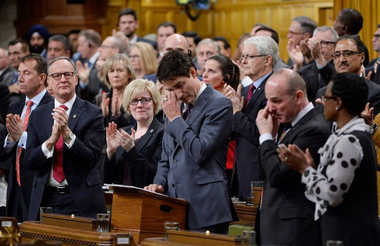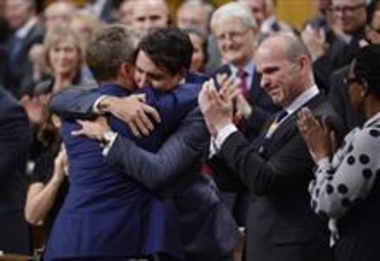Canada offers $85 million to victims of its ‘gay purge'

The Canadian government will pay up to 110 million Canadian dollars, or $85 million, to compensate victims of the so-called “gay purge,” decades of government-authorized discrimination against gay Canadians.
The announcement on Tuesday followed a speech in the House of Commons in Ottawa by Prime Minister Justin Trudeau, who apologized to the victims. The government program, which lasted for more than 30 years and ended only in the 1990s, caused thousands to lose their jobs and sometimes face prosecution because of their sexual orientation. The policy affected Canadians in the military, the public service and the Royal Canadian Mounted Police.
The government also introduced legislation to expunge “unjust convictions” from the judicial records of people charged under laws that criminalized homosexuality.
In a speech to victims and their supporters who had gathered in the gallery of the House of Commons, Mr. Trudeau apologized for “Canada’s role in the systemic oppression, criminalization, and violence” against sexual minorities.
“It is with shame and sorrow and deep regret for the things we have done that I stand here today and say: We were wrong,” he said.
He added, “It is my hope that in talking about these injustices, vowing to never repeat them, and acting to right these wrongs, we can begin to heal.”

In the 1950s, a special unit of the Mounties began a broad campaign aimed at removing gay and lesbian members of the military and other government institutions who were seen as vulnerable to blackmail by the Soviet Union. There are no known cases of gay public employees passing information with any foreign power.
To identify targets, the authorities conducted surveillance, made threats and even developed a so-called “fruit machine” built in order to detect homosexuality. At one point, 9,000 people were under investigation by the unit, according to some estimates.
Although Canada partially decriminalized homosexual acts in 1969, the program continued until 1992, ruining tens of thousands of lives, as gay people endured shame and punishments ranging from the loss of security clearance and jobs to imprisonment for “gross indecency and physical abuse.”
In some cases, lawyers for the plaintiffs said, some gay women were raped by men who told them it would correct their sexual orientation.
Some of the victims are believed to have committed suicide after their careers were destroyed.
Mr. Trudeau’s apology and his government’s historic settlement, which gay-rights advocates hailed as unprecedented anywhere in the world, are the latest steps in a review begun last year by his Liberal government to address the devastating impact of the discriminatory program.
“It’s something we can be extremely proud of in Canada,” said R. Douglas Elliott, the lead lawyer for the plaintiffs in the lawsuit. “At a time when America is going backward and trying to reintroduce discrimination, we are moving forward and facing this historic injustice, making reparations to the victims and an unshakable commitment that this discrimination will never be repeated.”
The settlement, which totals 145 million Canadian dollars, will allow surviving victims who faced government retaliation between 1962 and 1996 to claim compensation, Mr. Elliott said. They will also be eligible for financial compensation ranging up to 150,000 Canadian dollars for those who experienced severe psychological and physical harm.
Because many victims have died, 15 million Canadian dollars has been allocated for an array of reconciliatory and memorial measures in their honor. These will include the construction of a national monument in Ottawa and educational programs on the history of discrimination against gay and transgender people.
Simon Thwaites, 55, lost his house and livelihood after he was forced out of the Canadian military in 1989 because he was gay. He said his excitement over the settlement was tempered by the trauma he has endured for decades.
“It’s a great step, but you can’t take away the hurt and damage in one day,” Mr. Thwaites said.
Information was gathered from this article.
Copyright The Gayly – November 29, 2017 @ 10:00 a.m. CST





